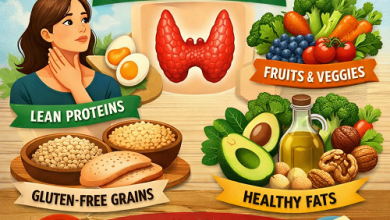Pregnancy Diet and Type 1 Diabetes: Why Small Choices Matter More Than Perfection

Pregnancy is often described as one of the most transformative journeys in a woman’s life. From the moment that second line appears on a pregnancy test, countless questions, hopes, and worries begin to take root. For women living with Type 1 Diabetes (T1D), these questions come with an extra layer of complexity: How will my blood sugar affect my baby? What should I eat to keep us both safe? Is it even possible to have a healthy pregnancy with T1D?
The good news is—yes, it is absolutely possible. Every day, thousands of women with T1D bring healthy, thriving babies into the world. The key isn’t chasing perfection but rather focusing on small, consistent choices that matter more than you might think. This article dives deep into the realities of pregnancy with Type 1 Diabetes, the role of diet, and why giving yourself grace may be the most powerful tool of all.
Pregnancy Diet and Type 1 Diabetes
A healthy pregnancy diet isn’t about rigid rules or cutting out entire food groups—it’s about finding balance and making small, mindful choices that support both mother and baby. For women with Type 1 Diabetes, this balance becomes even more important, as the right combination of carbohydrates, proteins, and healthy fats can help maintain steadier blood sugar levels throughout the day. Simple adjustments, like choosing whole grains over refined carbs, pairing snacks with protein, and eating smaller meals more often, can make a big difference without feeling overwhelming. Instead of striving for perfection, focusing on gradual, sustainable changes creates a strong foundation for a healthy pregnancy journey.
These risks sound frightening, but here’s the reassuring truth: With good medical care, regular monitoring, and thoughtful lifestyle choices, many women with T1D experience smooth pregnancies and deliver healthy babies.
The Myth of Perfection in Pregnancy
Pregnancy has a way of magnifying expectations. Social media feeds are flooded with women sipping green smoothies, practicing prenatal yoga, and seemingly “doing everything right.” For someone managing Type 1 Diabetes, this pressure can feel unbearable.
The reality? Perfect blood sugars don’t exist. Even the most diligent monitoring, carb counting, and insulin dosing cannot prevent occasional highs and lows. Stress, hormones, illness, sleep, and even weather can impact glucose levels.
The problem with chasing perfection is that it leads to guilt and anxiety, both of which can negatively affect pregnancy. Instead, experts encourage focusing on small, sustainable habits—the tiny choices that add up to a healthier pregnancy over time.
Why Small Choices Matter
The phrase “every bite counts” often gets thrown around in pregnancy nutrition conversations. But for women with T1D, it can feel like “every bite could make or break my blood sugar.” That’s not true. What truly matters are patterns—not individual meals or snacks.
Here are ways that small, daily choices create big impacts:
1. Balancing Carbohydrates Wisely
Carbohydrates are often seen as the enemy, but they are essential for both mother and baby. The trick is choosing slow-digesting carbs (whole grains, beans, vegetables, fruits with skin) over refined carbs that spike blood sugar.
- Small swap: Choosing oatmeal with berries instead of sugary cereal.
- Big impact: A steadier glucose curve and less post-meal insulin correction.
2. Pairing Protein and Fiber with Carbs
Adding protein (eggs, fish, chicken, tofu) and fiber (vegetables, legumes) slows digestion and prevents sharp glucose spikes.
- Small swap: A piece of whole-grain toast with peanut butter instead of plain toast.
- Big impact: Reduced blood sugar fluctuations and longer satiety.
3. Eating Smaller, More Frequent Meals
Pregnancy naturally increases appetite, and with T1D, eating huge meals can lead to dramatic glucose spikes. Smaller meals spread throughout the day help.
- Small swap: Splitting lunch into two smaller meals.
- Big impact: More stable blood sugars and less stress on insulin dosing.
4. Staying Hydrated
Hydration plays a vital role in blood sugar control, kidney function, and reducing pregnancy swelling.
- Small swap: A glass of water before each meal.
- Big impact: Better glucose absorption and fewer dehydration headaches.
5. Tracking, Not Obsessing
Continuous glucose monitors (CGMs) have revolutionized T1D pregnancy management, but the constant data can also feel overwhelming. Using numbers as guides, not judgments, makes the journey less stressful.
Building a Supportive Pregnancy Diet with T1D
Instead of striving for “perfect meals,” think about building balanced plates. Here’s a sample breakdown:
- Breakfast: Scrambled eggs with spinach, avocado slices, and a small serving of steel-cut oats.
- Snack: Greek yogurt with chia seeds and a few almonds.
- Lunch: Grilled chicken salad with quinoa, olive oil, and colorful vegetables.
- Snack: Carrot sticks with hummus.
- Dinner: Baked salmon, roasted sweet potato, and steamed broccoli.
- Evening snack (if needed): A small apple with almond butter.
Notice how each meal combines protein, healthy fats, and complex carbs—a simple formula that supports both maternal health and fetal development while keeping blood sugars steadier.
The Role of Technology and Medical Support
Pregnancy with Type 1 Diabetes is not a journey to take alone. Endocrinologists, diabetes educators, dietitians, and obstetricians all play critical roles in guiding safe choices.
- Insulin Pumps allow precise dosing and flexible adjustments.
- CGMs provide real-time data to help anticipate highs and lows.
- Frequent Checkups ensure both mom and baby are thriving.
These tools help women shift their mindset from fearing mistakes to embracing small wins. Every well-managed meal, every safe blood sugar correction, every healthy habit—these all matter far more than occasional fluctuations.
Mental Health: The Missing Piece of the Puzzle
Pregnancy already comes with emotional ups and downs, and when layered with T1D management, the stress can feel overwhelming. Studies show women with T1D during pregnancy report higher rates of anxiety and depression.
Here’s why mental health matters just as much as diet:
- Stress hormones can affect blood sugar control.
- Burnout can lead to skipped monitoring or irregular insulin dosing.
- Negative self-talk erodes confidence and joy during pregnancy.
Practical strategies include mindfulness, therapy, journaling, gentle movement, and connecting with other moms who’ve walked the same path. Above all, self-compassion is essential. No one has perfect blood sugars—not even outside of pregnancy.
Real Stories: Progress Over Perfection
Across the globe, countless women with T1D share stories of imperfect but beautiful pregnancies:
- A mother in Canada described how she felt crushed by a sudden high blood sugar after pizza night, only to be reassured by her doctor: “One meal doesn’t define your pregnancy. What matters is your overall trend.”
- Another in the UK shared how switching to smaller, frequent meals helped her reduce nighttime lows—and restored her confidence.
- In the U.S., a mom of two revealed that her biggest breakthrough wasn’t in diet or insulin—it was in letting go of guilt and celebrating the healthy choices she was making.
These stories highlight an
Why This Message Matters for the Future
The narrative around Type 1 Diabetes and pregnancy often swings between fear and unrealistic expectations. But by focusing on small, consistent choices, women can reclaim a sense of control and empowerment.
This shift in perspective matters not just for current mothers but also important truth: Healthy pregnancies with T1D are built on resilience, not perfection.for future generations. Babies born to mothers who modeled self-compassion and resilience are more likely to grow up in households where health is pursued joyfully—not fearfully.
Conclusion: Grace Over Perfection
Pregnancy with Type 1 Diabetes is undeniably challenging, but it’s also filled with opportunities to build resilience, strengthen habits, and embrace small victories. Diet is not about chasing flawless numbers—it’s about making consistent, balanced choices that support both mother and baby.
So, to every expectant mother with T1D reading this:
- That one high blood sugar reading does not define you.
- That one imperfect meal will not harm your baby.
- What matters most is the pattern of care, the effort you give, and the love you’re pouring into this journey.
Because in the end, pregnancy is not about perfection. It’s about progress, resilience, and the powerful truth that small choices matter more than perfection.




